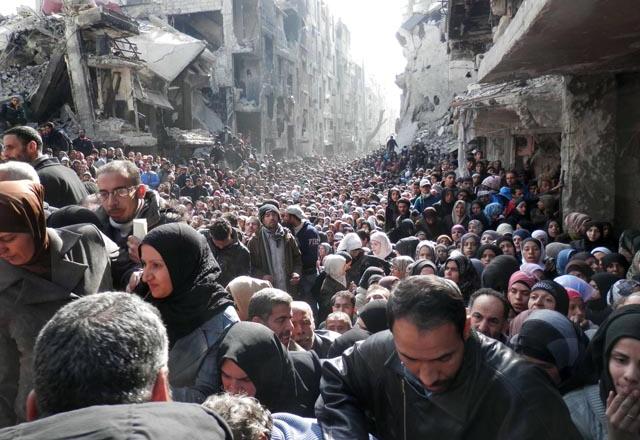BEIRUT — At least seven civilians died of hunger and lack of medical care in two days in besieged areas around the Syrian capital Damascus, medical sources said on Tuesday.
The Syrian Observatory for Human Rights, a monitoring group, said medical sources documented three deaths at the Yarmouk Palestinian refugee camp in southern Damascus, and another four deaths in the eastern Ghouta suburb of the city between Monday and Tuesday.
“Two men, one of them elderly, and a young girl died on Monday after a deterioration in their health as a result of lack of food and medicine in Yarmouk,” the group said.
The camp, once home to some 150,000 Palestinians as well as Syrian residents, has been under a tight army siege for seven months.
The restrictions have led to the deaths of more than 100 people in the camp, much of which has been destroyed by fighting between regime and opposition forces.
The UN agency for Palestinian refugees UNRWA began distributing aid to the camp in mid-January, but operations were suspended on February 8 after fighting erupted.
On Sunday, a Palestinian official said all non-Palestinian gunmen had left the camp, but UNRWA said it had not been given permission to resume operations.
On Monday night, UNRWA urged all sides to allow renewed access.
“UNRWA strongly appeals to all parties to give the utmost priority to addressing the hunger, malnutrition and protracted suffering of civilians inside Yarmouk,” UNRWA spokesman Chris Gunness said.
“The authorities and concerned parties can do this by allowing UNRWA unrestricted, uninterrupted and substantial humanitarian access.”
In eastern Ghouta meanwhile, a Damascus suburb, the observatory said a girl, a woman and a man had died on Monday and a man on Tuesday as a result of shortages of food and medicine.
The region, which is considered an opposition stronghold, was targeted in a chemical weapons attack last August that is believed to have killed hundreds of people.
The attack prompted the United States to threaten military action that was forestalled when Syria agreed to give up its chemical weapons for destruction.
Observatory Director Rami Abdel Rahman said a trickle of aid had entered eastern Ghouta, but not enough to alleviate widespread humanitarian suffering.
“There are some who are less able to resist than others, and people are succumbing for lack of food and medical care. It’s a real war crime,” he said.
The Syrian army has used siege tactics against a number of rebel strongholds, including the central town of Homs.
Some 1,400 of the 3,000 people trapped inside the Old City of Homs were evacuated by the United Nations and Red Crescent workers last week, and aid distributed inside.
But the operations came to a halt at the end of last week and have yet to resume.
















